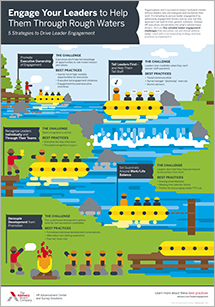Auto logout in seconds.
Continue LogoutRead Advisory Board's take on this story
The role of the health system board is evolving to encompass more responsibilities than it did in the past, from compliance patient satisfaction to hiring, Alex Kacik reports for Modern Healthcare.
Access our strategic planning retreat toolkit
Health systems boards are changing
In the past, sitting on a health system board was more of a transactional job, focusing on things like executive pay, according to Kathy Hastings, executive workforce practice leader at Sullivan, Cotter and Associates, a compensation consulting firm.
However, as consumerism in health care grows, boards are now expected to provide health systems with deeper insights. For example, boards are playing roles in attracting talent from nontraditional markets, benchmarking health system performance metrics against market competitors, ensuring health systems remain compliant with federal regulations, and maintaining leadership diversity and pay equity.
Boards are starting to look at more than profits and losses, Hastings said. According to Kacik, this means boards are paying closer attention CMS' star ratings, patient satisfaction, mortality rates, readmission and patient safety data.
William Horton, a partner at the law firm Jones Walker, said, "Boards tend to be much more focused. They ask questions and get involved. They don't want to end up being accused by a government agency of playing along and not taking action."
Industry observers also expect that board members will have crucial role as health care systems seek to get closer to consumers by, for instance, entering the retail space. If a health system decides to become a part of retail health, a health system's board must have an understanding of formulary design, Medicaid managed care, and pharmacy benefit management, Kacik reports.
What health systems are doing
At Nemours Children's Health System, board members have professional backgrounds in entertainment, finance, technology, and real estate, which has allowed them to play a part in improving the health system's information security.
Gina Altieri, SVP and chief of strategy integration at Nemours, said, "The value the board brings is being able to take a step back and provide a higher-level view." She added, "They recognize that you can't just keep building buildings" and the members of the board have focused on investments in consumer and technology infrastructure. According to Altieri, Nemours established a data governance board designed to check data and define metrics, which resulted in improvements in care coordination.
Nemours CEO David Bailey said the health system's board takes the lead when it comes to ensuring Nemours complies with state and federal regulations as well. He said, "The largest risk area for health care systems is in billing, coding and compliance."
Meanwhile, the board members at Bon Secours Health System, who have professional backgrounds in finance, academia, and philanthropy, have examined performance data and patient feedback to improve patient satisfaction.
Members of the board compared how the health system performed in comparison to its peers and assessed the financial benefits of the health system having higher patient satisfaction. According to Modern Healthcare, the members shared the data with physicians and upper management.
Shelly Buck, former COO and chief nursing executive at Bon Secours who is now at WellSpan Health, said the board ultimately decided to implement new training as well as set and track performance goals related to patient satisfaction. The board's plan ultimately helped the health system increase its overall satisfaction rating from 10% to 71%, Buck said.
At Kaiser Permanente, the board helped the health system evaluate its existing partnership with Target by examining quality scores, capital expenses, and the total cost of care at four initial retail clinics. With the board's guidance, Kaiser now plans to add 31 more retail clinics in Target's Southern California stores.
Paul Minardi, the medical director of business management for Kaiser's Southern California Permanente Medical Group, said the board considered whether the retail clinics "help create a more affordable approach to manage the total cost of care for patients."
While some health systems are revamping the role their boards play, Keckley said these boards are more the exception than the rule. According to Keckley, most boards do not devote enough time to assessing strategic direction. "I'm just seeing a void of knowledge," Keckley said, adding that many boards defer to the CEO. "Boards have more risk. They are going to have to be smarter, more engaged—and have some independent judgment," he said (Kacik, Modern Healthcare, 6/2).
Advisory Board's take
By  Amanda Berra, Senior Research Partner, Health Care Advisory Board
Amanda Berra, Senior Research Partner, Health Care Advisory Board
As this article indicates, the bar for leadership of hospital systems is rising—including for the board. This is one of the reasons why our Health Care Advisory Board team is working on new research about board effectiveness—and we'd love to hear from you about your hospital or health system's board and how it fits into the organization's overall governance.
We are doing both qualitative research interviews (if you’d like to participate, email Amanda Berra, BerraA@advisory.com) as well as asking members to complete a survey about your organization's board selection, recruitment and approach to governance change. Any executive who is familiar with the board and its workings can answer the survey—and, regardless of membership type, all survey respondents can elect to receive a full free copy of the research and the insights we gleam about how to best incorporate the board into your organization.
Click here to access the survey.
So far, three intriguing findings have caught our attention:
Even boards that meet most existing standards for "board effectiveness" may not be realizing their full potential. Conventional guidance for board effectiveness can be a game-changers, especially in boosting efficiency. Yet, we've noticed that even boards that are hitting all the marks on conventional effectiveness (e.g. efficiency or engagement) still have significant room for improvement in meeting their full potential. Rather, the most effective boards are not just effective internally—but their performance standards are deeply connected to the organization's larger goals. Leaders can achieve this by questioning how the board fits into the organization's future. For instance, they can ask: "What are the top 3 goals this organization must hit, or decisions we must navigate, in order to thrive in the next 1-3 years? What help do we need from the board to get there? What contributions can only the board make? Is it currently positioned to help in that way?"
Looking at the Modern Healthcare article, what jumps out is the fact that the terrain tackled by the boards at the profiled institutions varies—that's as it should be. The lesson is not, "we need our board to do what this other board did to achieve a patient experience turnaround"—instead, it's "what is out top priority goal” and then "what specifically do we need from our board to do to achieve it," and finally "could our board of today actually deliver that support? If not, what can we do to make sure it can.
Major changes in governance over the last 5 years—reported by 39% of respondents in the survey—have left many systems struggling to incorporate multiple layers and types of boards. The growth of large hospital systems and the push for 'systemness' has left many systems struggling to incorporate legacy boards or conflicting board structures. For instance, leaders have had difficulty differentiating the role of system-wide versus entity boards, and trying to streamline along those different lines.
Additionally, we've heard a lot about how many "advisory only" boards are left questioning their importance. Several best practices have emerged about how to help them live up to their full potential, such as the importance of forging good relationships with community leaders and engaging in local advocacy on big-impact issues. In short, those entity-level board members can act as local ambassadors—but only if they have the right type of people. Recruiting for that type of person, setting expectations for the role, and supporting them with the necessary information to represent the entity and the system well are all important goals for leaders to help them function.
There is considerable diversity in how much control the organization's top-level board has over their strategy. We've heard in a lot of conversations about the theoretical ideal of a board that is a more active partner in the hospital's strategy. But survey results indicate that board's actual control varies substantially. So far, 60% of survey respondents say that their top-level board has "substantial" control over strategy, 8% said the board has "moderate" control, 25% reported "minimal" control, and 8% said "no control at all."
It's another question if more board involvement in strategy is even possible (or desirable), given the complexity of the health care business and the danger of governance crossing over into management terrain. But, if increasing the board's active role in strategy is possible and desirable, then we should try to figure out how boards can best play that role. It seems to us that boards could benefit from dedicated education about how to be good partners in strategy as well as more education into the specific strategy challenges that most hospitals and systems are facing today. It is essential to both define what these challenges are (in jargon-free language, such as "How should we think about competing with nontraditional players?") and the board-specific questions, decisions, and action items needed in each terrain.
These insights are just the beginning of what we hope to uncover with this research. To help us, and to receive a copy of the final report, please fill out our survey.
Your next strategic plan is ready
Our strategic plan template gives you step-by-step guidance and presentation-ready slides for performance analysis, market assessment, strategic plan design, and plan evaluation—just updated for 2018.
Download it now to plan and track performance of a comprehensive organizational strategy, including financial planning, implementation planning, and communication planning.
Don't miss out on the latest Advisory Board insights
Create your free account to access 1 resource, including the latest research and webinars.
Want access without creating an account?
You have 1 free members-only resource remaining this month.
1 free members-only resources remaining
1 free members-only resources remaining
You've reached your limit of free insights
Become a member to access all of Advisory Board's resources, events, and experts
Never miss out on the latest innovative health care content tailored to you.
Benefits include:
You've reached your limit of free insights
Become a member to access all of Advisory Board's resources, events, and experts
Never miss out on the latest innovative health care content tailored to you.
Benefits include:
This content is available through your Curated Research partnership with Advisory Board. Click on ‘view this resource’ to read the full piece
Email ask@advisory.com to learn more
Click on ‘Become a Member’ to learn about the benefits of a Full-Access partnership with Advisory Board
Never miss out on the latest innovative health care content tailored to you.
Benefits Include:
This is for members only. Learn more.
Click on ‘Become a Member’ to learn about the benefits of a Full-Access partnership with Advisory Board
Never miss out on the latest innovative health care content tailored to you.

